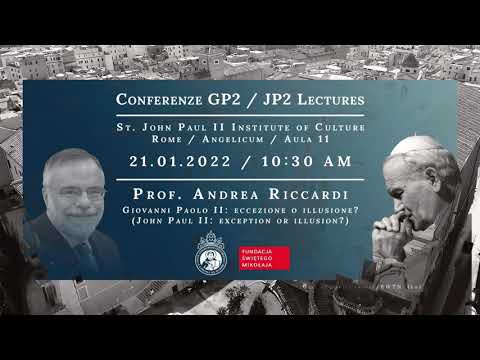
- This event has passed.
JP2 Lectures // Andrea Riccardi: Exception or Illusion?
January 21, 2022 @ 10:30 am

On Friday, January 21st, another lecture of the Institute of Culture of St. John Paul II at the Angelicum in Rome was held, the fourth in this academic year. The lecture was entitled “John Paul II: exception or illusion?” and was delivered by Prof. Andrea Riccardi, Professor of Modern History at the University of La Terza in Rome. Dariusz Karlowicz, president of the St. Nicholas Foundation and the St. John Paul II Cultural Institute program director at the Angelicum in Rome, introduced the audience to the subject matter.
In his opening speech, Prof. Riccardi noted that historiography pays relatively little attention to the long and complex pontificate of John Paul II, which lasted a full twenty-seven years. Although Benedict XVI has often referred to the pontificate of John Paul II, according to Riccardi, we can speak of falling into the oblivion of his figure.
Riccardi reminded the audience of John Paul II’s first message in 1978. It was a call from the Pope to oppose fear. It was directed at Eastern Europeans oppressed by the communist regime and at Christians living in Western Europe overwhelmed by overwhelming secularization. According to the speaker, John Paul II made a change of emphasis in the teaching of the Church. It was also a geopolitical vision for Europe guided by a mystical passion. Wojtyla did not accept the Cold War divisions. For him, the true boundaries of the European continent were established by the spread of the Gospel, as in the East, and thus the “continent” also included Russia and all Soviet lands.
In the following lecture, Riccardi pointed out that for John Paul II, the main field of evangelization was culture. Faith must be grounded by entering into a process of profound reception that touches the “heart” and becomes culture. He recalled the Pope’s words in 1982: “A faith that does not become a culture is a faith not fully received, not fully thought through, not faithfully lived.” John Paul feared a faith separated from culture, ephemeral, not transferable between generations, and essentially privatized. Riccardi found it significant that Cardinal Bergoglio, Archbishop of Buenos Aires, strongly emphasized the relationship between faith and culture proposed by John Paul II.
Riccardi then emphasized that the pontificate of John Paul II was also characterized by a recognition of cultural value and shared experiences. The Pope became a leading figure in inter-religious dialogue, including organizing meetings in Assisi. According to Riccardi, John Paul II was able to combine the theology of the nation with its historical significance with the universalism of the family of nations and the coexistence of religions or ethnic and cultural identities.
In leading Poles to free themselves from the yoke of the Marxist regime, John Paul II also used political tools. As Riccardi points out, the Pope, while condemning South American liberation theology for its overly Marxist inspirations, himself developed and effectively applied his theological reflection on social justice and the ethics of work that was free of these errors.
The fall of communism in Poland in 1989 transcended concepts of revolutionary violence and class struggle, reversing the two-hundred-year-old paradigm of the French Revolution and showing the whole world the way to peaceful change. The Church played a significant role in these changes, creating a safe spiritual and social space in which the hope of liberation could grow and consciences could be formed, the strength of which was crucial at that time. Unexpectedly, the consistently non-violent action of people bearing witness to the Truth was able to disarm their opponents.
Also important to John Paul II was the Church’s attitude toward migrants, whom the Pope saw as a sociological phenomenon, and Christ himself, who expects our help and love. This Catholicity is not only expressed in the community of the baptized but also hospitality to strangers, regardless of their religion.
Following this line, Riccardi pointed out that for Wojtyla, the influence of the Church on history was significant. Therefore, John Paul II was not only a pope ahead of the Church but also a charismatic leader whose pontificate was saturated with pilgrimages and symbolic gestures. This is also the meaning that John Paul II attributed to the Millennium Year, which in his eyes was to be a time of transformation and reform, to make the Church “a house and school of communion” to listen more attentively to the people of God and to be open to new charisms.
In concluding the lecture, Riccardi noted that the pontificate of John Paul II, with all its richness of issues, still requires reflection, especially in the context of the current state of Europe and the Church.
Summary: Bartłomiej Kabat & Jakub Reszke Translation: Bartłomiej Kabat